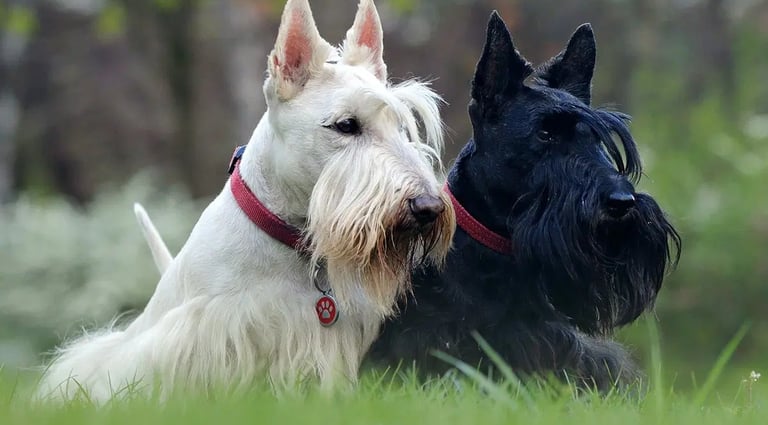Scottish Terrier: The Loyal and Spirited Companion You Need to Know About
Discover everything about the Scottish Terrier, from its history and personality to care tips and health. Learn why this small dog with a big heart is a perfect family pet.
8/10/20254 min read
If you have ever seen a small, sturdy dog with a distinctive beard and expressive eyes, chances are you have met a Scottish Terrier. Known affectionately as the Scottie, this breed is one of the most recognizable and beloved terriers worldwide.
Scottish Terriers are famous not only for their unique looks but also for their bold personality and unwavering loyalty. Whether you are a seasoned dog owner or considering your first pet, understanding the Scottie’s traits, needs, and charm will help you decide if this breed is the right fit for your family.
A Brief History of the Scottish Terrier
The Scottish Terrier has roots that go deep into Scotland’s rugged landscapes. Originally bred to hunt vermin such as rats and foxes, Scotties were valued for their courage and tenacity. Their compact size allowed them to dig out prey from burrows and navigate tight spaces with ease.
Their distinctive coat, which is wiry and weather-resistant, helped protect them from harsh weather conditions common in the Scottish Highlands. Over time, the Scottie became a beloved companion animal and symbol of Scottish pride.
The breed gained international fame in the early 20th century, becoming a favorite among celebrities and even U.S. presidents. For instance, President Franklin D. Roosevelt was known for his beloved Scottie named Fala.
What Makes Scottish Terriers Special?
Scottish Terriers are small dogs, typically weighing between 18 to 22 pounds. But what they lack in size, they make up for in character. Here’s what sets them apart:
Bold and Confident
Scotties are fearless dogs with a strong personality. They carry themselves with an air of dignity and are not easily intimidated, making them excellent watchdogs despite their small stature.
Loyal and Protective
Once they bond with their family, Scottish Terriers are deeply loyal. They tend to be protective and alert, always aware of their surroundings. They can be reserved around strangers but warm up quickly once trust is built.
Independent Yet Affectionate
Scotties are known for their independent streak. They are intelligent and can be somewhat stubborn during training. However, they are also affectionate and love spending quality time with their owners.
Ideal Living Conditions for a Scottish Terrier
Scottish Terriers adapt well to various living environments. Whether you have a city apartment or a spacious suburban home, a Scottie can thrive if given proper care and attention.
While they don’t need large yards, daily walks and playtime are essential to keep them mentally and physically stimulated. They enjoy exploring and can be quite energetic despite their compact size.
Grooming and Care Tips
One of the most striking features of the Scottish Terrier is its coat. Their wiry fur requires regular grooming to stay healthy and neat. Here’s what you need to know:
Brushing: Brush your Scottie’s coat several times a week to prevent mats and tangles.
Hand Stripping: Many owners opt for hand stripping, a grooming technique that removes dead hair and maintains coat texture.
Bathing: Bath your Scottie every few weeks or as needed to keep them clean without stripping natural oils.
Nail Trimming and Ear Care: Regularly trim nails and clean ears to prevent infections.
Regular grooming sessions are also a great time to bond with your dog and check for any skin issues or abnormalities.
Health Considerations
Scottish Terriers are generally healthy dogs, but like all breeds, they are prone to certain conditions. Being aware of these can help you provide the best care possible:
Scottie Cramp: A neurological disorder that causes muscle stiffness. It is manageable with veterinary care.
Von Willebrand’s Disease: A blood clotting disorder. Regular check-ups help monitor this condition.
Allergies and Skin Issues: Keep an eye out for itching or redness and consult a vet if problems arise.
Routine veterinary care, a balanced diet, and regular exercise will keep your Scottie happy and healthy.
Training and Socialization
Early socialization and training are essential for Scottish Terriers. Because of their independent nature, patience and consistency are key. Use positive reinforcement techniques like treats and praise to encourage good behavior.
Scotties can be wary of other dogs, so early exposure to different environments and friendly pets helps prevent behavioral issues later. Their alertness and protective instincts make them great watchdogs, but proper training ensures they don’t become overly territorial.
Fun Facts About Scottish Terriers
Scottish Terriers were the first dog breed to have a U.S. postage stamp.
They have been featured in popular culture, including movies, cartoons, and as mascots.
Despite their tough exterior, many Scotties love cuddling and being lap dogs.
Is a Scottish Terrier Right for You?
If you want a dog that combines personality, loyalty, and a dash of independence, the Scottish Terrier might be your perfect match. They suit active individuals and families who appreciate a spirited companion with classic style.
Keep in mind that their grooming needs and training require time and commitment. But for those willing to invest in their care, Scotties offer years of devoted companionship and entertainment.
Conclusion
The Scottish Terrier is a small dog with a big heart and even bigger personality. From its rich history in Scotland to its role as a cherished family member worldwide, the Scottie is a breed that captures attention and affection wherever it goes.
By understanding their unique traits and needs, you can ensure your Scottish Terrier lives a happy, healthy, and fulfilling life. If you are looking for a loyal, confident, and charming pet, the Scottish Terrier may just be the companion you have been searching for.




